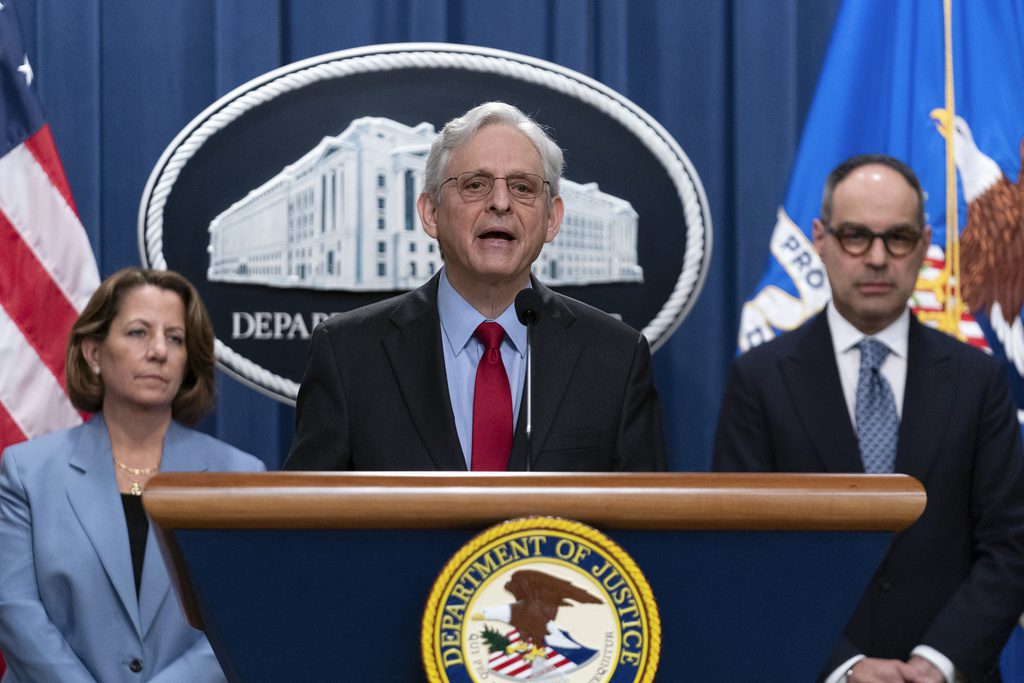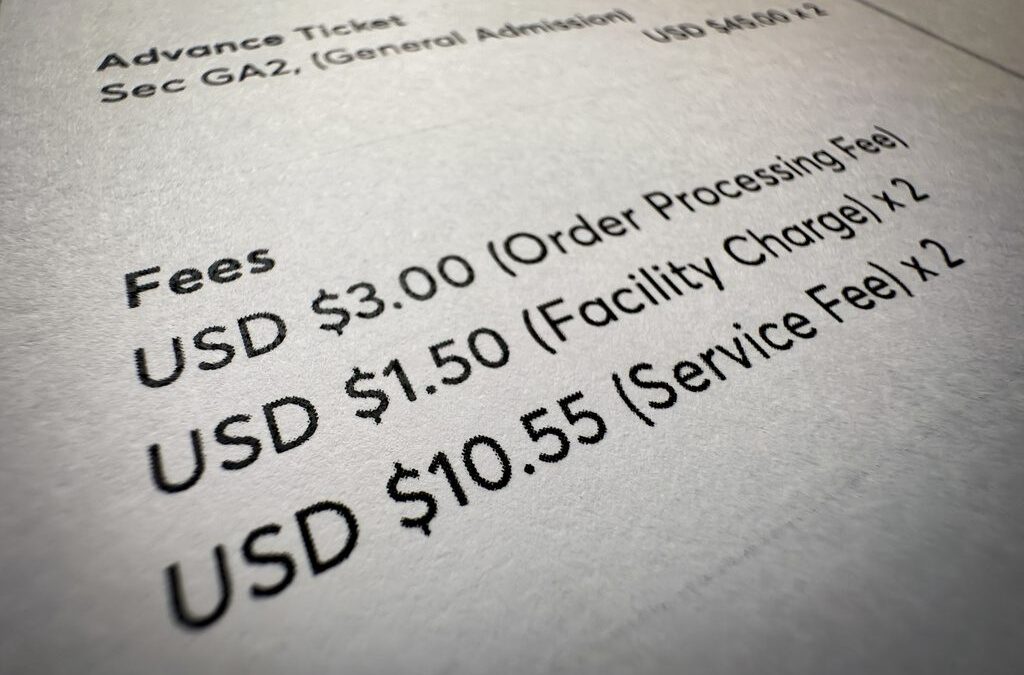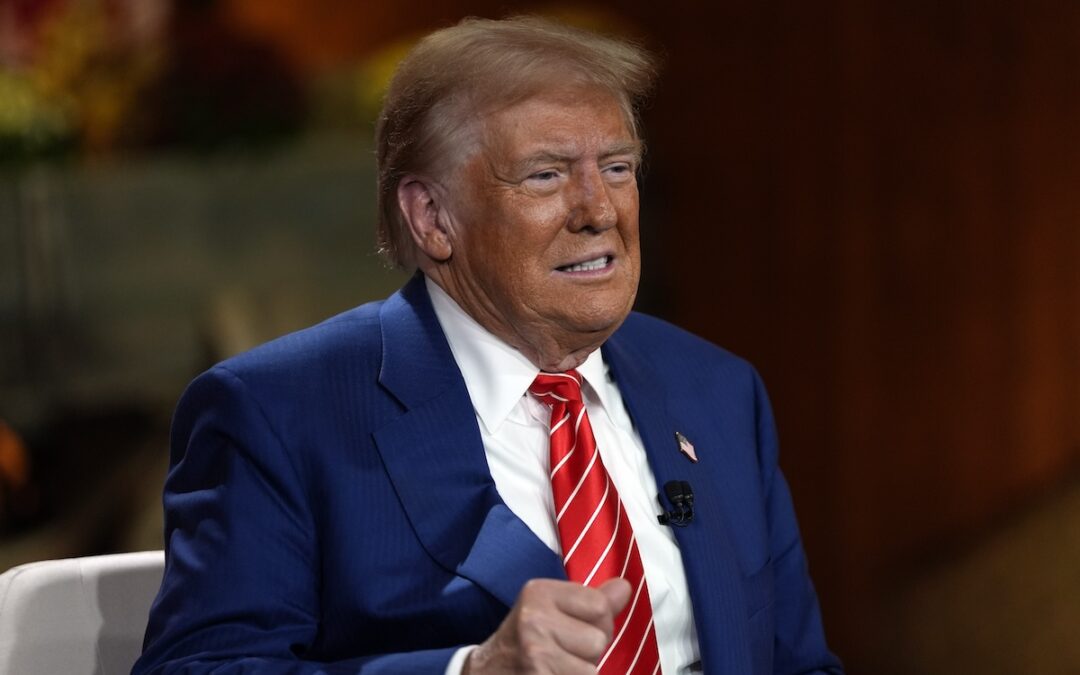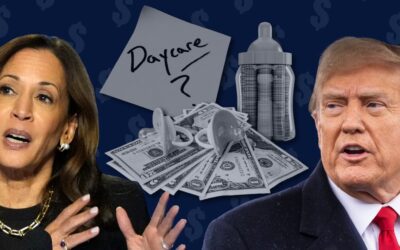
Attorney General Merrick Garland flanked by Deputy Attorney General Lisa Monaco and Assistant Attorney General Jonathan Kanter of the Justice Department's Antitrust Division, speaks during a news conference at the Department of Justice headquarters in Washington, Thursday, May 23, 2024. The Justice Department has filed a sweeping antitrust lawsuit against Ticketmaster and parent company Live Nation Entertainment, accusing them of running an illegal monopoly over live events in America and driving up prices for fans. The lawsuit was filed Thursday in New York and was brought with 30 state and district attorneys general. . (AP Photo/Jose Luis Magana)
The lawsuit is backed by attorneys general for 29 states plus Washington, D.C., and alleges that Live Nation leveraged its power as a venue owner, concert promoter, and ticket seller in order to lessen consumer choice, raise prices, and eliminate its rivals.
The Biden administration on Thursday filed a lawsuit against Live Nation, the parent company of Ticketmaster, alleging that the company violated antitrust laws in order to create a monopoly over the live events industry in the United States.
The suit, which was filed by the Department of Justice in the Southern District of New York, is backed by attorneys general for 29 states plus Washington, D.C., including Pennsylvania Attorney General Michelle Henry. It alleges that the company leveraged its power as a venue owner, concert promoter, and ticket seller in order to lessen consumer choice, raise its prices, and eliminate its rivals.
“Live Nation relies on unlawful, anticompetitive conduct to exercise its monopolistic control over the live events industry in the United States at the cost of fans, artists, smaller promoters, and venue operators,” Attorney General Merrick Garland said in a statement. “The result is that fans pay more in fees, artists have fewer opportunities to play concerts, smaller promoters get squeezed out, and venues have fewer real choices for ticketing services. It is time to break up Live Nation.”
The suit notes that Live Nation currently manages more than 400 artists and controls about 60% of concert promotions at major venues. Plus, through Ticketmaster, the suit notes that the company controls roughly 80% or more of these venues’ ticketing. The company’s influence extends even further when the resale market is taken into consideration.
As a result, Ticketmaster is able to “impose a seemingly endless list of fees on fans,” Garland said during a press conference on Thursday.
“Those include ticketing fees, service fees, convenience fees, platinum fees, price master fees, per-order fees, handling fees, and payment processing fees, among others,” he said. “For fans in the United States, this illegal conduct means higher prices.”
Live Nation is also accused of working with a venue management firm called Oak View Group–which was co-founded by former Live Nation chairman Irving Azoff–in order to steer clients into signing exclusive agreements to use Ticketmaster. The company is further accused of threatening competitors and acquiring others in order to further control the industry.
Additionally, Live Nation has allegedly signed long-term, “exclusionary” deals with certain venues in order to ensure they don’t seek alternative management companies or ticketing platforms.
“In other countries, where venues are not bound by Ticketmaster’s exclusive ticketing contracts, venues often use multiple ticketing companies for the same event, and fans see lower fees and more innovative ticketing products as a result,” Garland added.
Live Nation called the DOJ’s accusations “baseless” in a statement.
“The DOJ’s lawsuit won’t solve the issues fans care about relating to ticket prices, service fees, and access to in-demand shows,” it said. “Calling Ticketmaster a monopoly may be a PR win for the DOJ in the short term, but it will lose in court because it ignores the basic economics of live entertainment, such as the fact that the bulk of service fees go to venues, and that competition has steadily eroded Ticketmaster’s market share and profit margin.”
Consumer advocacy groups praised the DOJ’s announcement on Thursday.
Morgan Harper, director of policy and advocacy at The American Economic Liberties Project, an anti-monopoly group, said in a statement that “Live Nation-Ticketmaster has acted as the mafia boss of the live events industry.”
She said that the company has been “using its power to rip off fans with sky-high prices and junk fees, exploit musicians and artists, and bully workers and small business owners in the industry.”
“Since 2022, we’ve been urging the government to take action to stop the obvious abuses of this cartoonishly-villainous monopoly—mobilizing the 100,000-plus Americans who sent letters to the Department of Justice through our ‘Break Up Ticketmaster Coalition,’” she added. “Today is a historic, long-awaited day for fans, artists, and independent businesses in the live events industry—the Department of Justice is officially seeking to break up one of America’s most infamous monopolies.”
Past Criticism
Criticism from fans and artists isn’t a new thing for Ticketmaster.
It faced backlash last year from both the White House and Congress over the debacle that was selling tickets for Taylor Swift’s Eras Tour. Fans from around the world expressed outrage over what many called “exorbitant” hidden fees, as well as platform outages.
Some fans even sued Ticketmaster, and the issue prompted investigations in Nevada, Pennsylvania, and Tennessee. It also prompted the investigation that led to the lawsuit announced Thursday.
President Biden and Consumer Advocacy
President Biden has made consumer advocacy and breaking up monopolies a foundation element of his presidency. Over the past year alone, his administration has fought against corporate price gouging, hidden fees, and alleged anti-competitive behavior.
Over the past year, several bills have been introduced to address the issues that affect ticket buyers. Just last week, the House passed the Transparency in Charges for Key Events Ticketing (TICKET) Act, which would require sellers to disclose all costs and fees upfront.
Additionally, over 250 artists recently signed a letter in support of the Fans First Act, which was introduced in the Senate late last year; it seeks to improve price transparency and consumer protections as well as prevent the charging of exorbitant prices. The legislation would further bolster the Better Online Ticket Sales Act, which was passed in 2016 and prohibits scalpers from using certain software to purchase tickets to events in bulk.
The Biden administration has also proposed a new rule that would prohibit companies across the private sector from hiding additional fees from consumers.
The proposed FTC rule would require all industries under its jurisdiction to show the full price of an item being purchased to the consumer “up-front,” meaning before they get to checkout. The rule would apply to concert and sports tickets, apartment and car rentals, hotel rooms, and more.
Companies that violate the proposed rule would be subject to financial penalties and be required to compensate consumers.
“Folks are tired of being taken advantage of, and being played for suckers,” Biden said in a speech at the White House in October. “[These] charges are taking real money out of the pockets of American families. These junk fees can add up to hundreds of dollars, weighing down family budgets, making it harder to pay family bills. These junk fees may not matter to the wealthy, but they sure matter to working folks in homes like the one I grew up in.”

Medical debt will no longer appear on credit reports for all Americans
This new rule will erase an estimated $49 billion in unpaid medical bills from the credit reports of roughly 15 million Americans, according to the...

Sick of hidden fees on concert tickets and hotel stays? A new federal rule bans them.
Now, live event businesses and hotels must clearly list their prices in both their advertising and pricing information. American consumers on...

Trump’s tariff plan would raise prices and ‘reduce the living standard of Americans,’ economists say
Trump’s plan would effectively be a sales tax that disproportionately harms working-class families and could cause a trade war that hurts US...

Trump’s tariff and tax plan would raise taxes on 95% of Americans, report finds
In response to the report, the Harris-Walz campaign released an analysis of its own, outlining how Trump’s agenda would raise costs for over 5.3...

Trump’s economic plans would worsen inflation, experts say
Mainstream economists warn that Trump's plans to impose huge tariffs on imported goods, deport millions of migrant workers, and demand a voice in...




